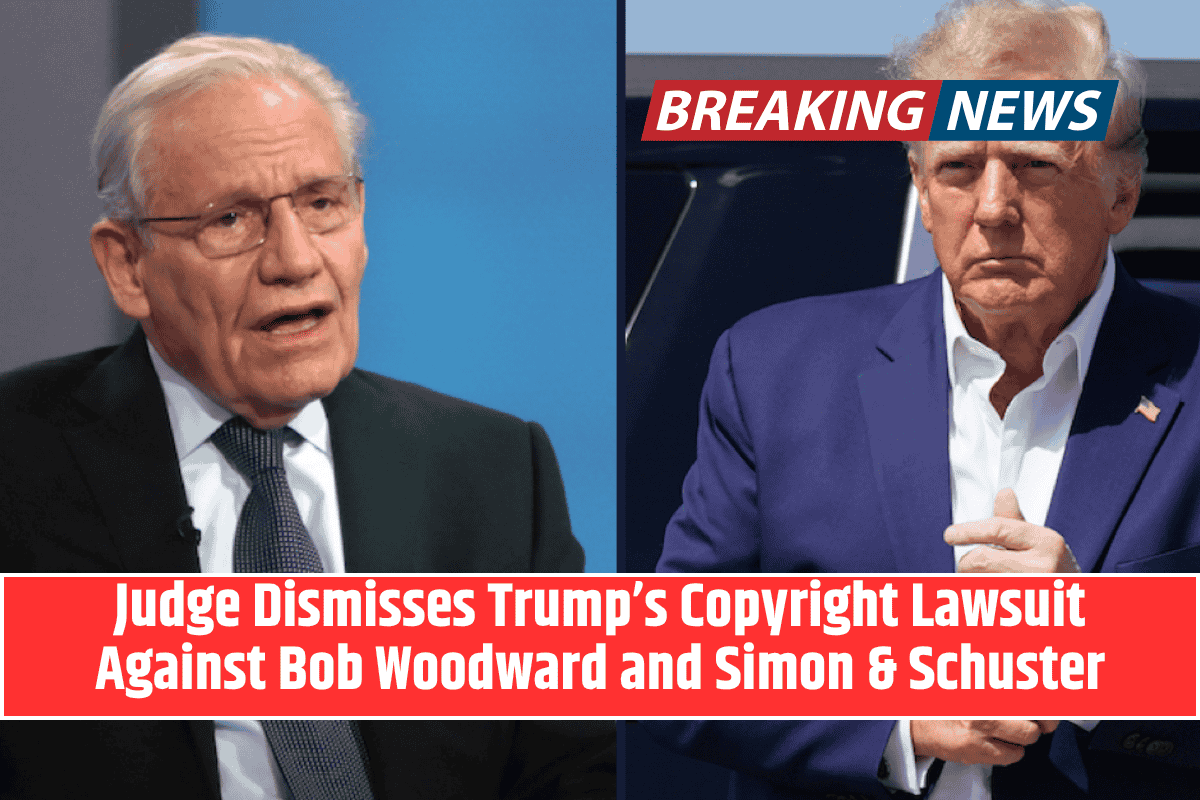A federal judge has dismissed a copyright lawsuit filed by former President Donald Trump against renowned journalist Bob Woodward and the book publisher Simon & Schuster.
The lawsuit, which centered on a series of interviews Trump gave to Woodward during his presidency, was rejected on the grounds that Trump did not contribute enough to the interviews to claim copyright protection over them.
The Case and Trump’s Allegations
Trump’s legal action, filed in January 2023 in Florida, claimed that the audio recordings from his interviews with Bob Woodward were copyrighted works that Woodward had exploited without permission.
Trump accused Woodward of using the material in a way that violated copyright, contract, and licensing laws. The lawsuit named Woodward, the publisher Simon & Schuster, and its parent company, Paramount Global, as defendants.
According to the complaint, Trump believed that the audio from the interviews, conducted during his first presidential term, was protected under various legal principles related to copyright, fairness, and consent.
He alleged that the material was being manipulated, usurped, and distributed without his approval. Trump also sought to establish that the audio was subject to various limitations on its use.
However, the case quickly lost momentum. In August 2023, a Florida court ruled to transfer the case to the Southern District of New York, citing the district’s more significant connection to the dispute and the parties involved.
Court’s Ruling: No Copyright Protection for Trump’s Responses
U.S. District Judge Paul G. Gardephe, appointed by President George W. Bush, ultimately dismissed the case in its entirety.
The judge explained that Trump had not sufficiently demonstrated that he played any role in “fixing” the interviews into a tangible medium of expression, which is a crucial aspect of U.S. copyright law. Under copyright law, the author of a work must be the person who translates an idea into a fixed, tangible form, such as a recording.
In this case, Judge Gardephe pointed out that Woodward had recorded the interviews, making him the “author” of the work under copyright law. The judge likened Trump’s involvement in the interviews to that of an actor in a film—a position that would not entitle someone to copyright ownership over a work simply by participating in it.
The court found that Trump’s responses to Woodward’s questions did not constitute a work of authorship entitled to copyright protection. While the interviews were certainly a collaborative effort—Woodward asking questions and Trump providing answers—the judge made clear that participation alone doesn’t grant automatic copyright rights.
As the court pointed out, there is almost no legal support for the claim that an interviewee holds a copyright interest in their responses to interview questions.
Why the Case Was Dismissed
Judge Gardephe emphasized that interviews are considered unified works, not collections of random, individual statements. Stripping the responses from the questions would violate the fundamental principles of copyright law, which treats such interviews as cohesive entities rather than separate, independent pieces of content.
The judge further argued that Trump’s responses, when taken alone, had little to no independent meaning outside the context of Woodward’s questions. Therefore, because Trump’s contributions were inseparable from the work as a whole, they could not be granted separate copyright protection.
Impact of the Ruling
This ruling marks a significant legal setback for Trump, who had sought to claim ownership over the material from his interviews with Woodward. The dismissal of the case serves as a reminder of the importance of establishing true authorship in copyright claims.
Judge Gardephe’s decision underscores that participation in a work, even if significant, does not automatically entitle someone to claim copyright ownership over the entire work.
The dismissal also highlights the challenges Trump faced in making a compelling legal argument that would justify the copyright protection he sought. This loss marks a blow in a series of legal battles related to Trump’s personal and professional matters.






